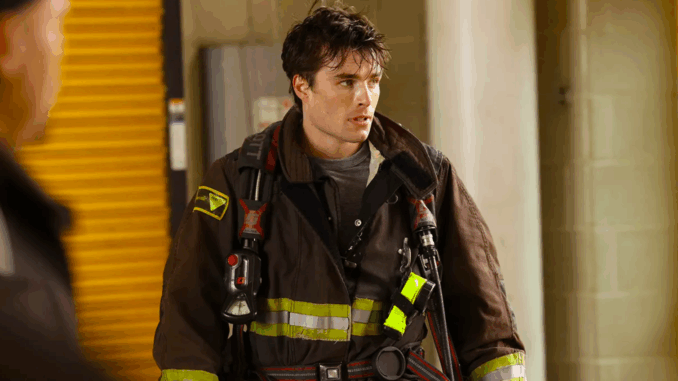
A Shocking Scene That Changed Everything
Chicago Fire has never shied away from high-stakes drama, but Season 13 delivered one of its most jarring moments yet — a tense standoff involving a gun and a child that had viewers holding their breath. While the moment itself was executed with pulse-pounding intensity, what truly lingers is what it says about Damon’s return to Firehouse 51. What should have been a triumphant comeback is now under scrutiny, thanks to a single moment that exposed deeper cracks in the foundation.
The scene in question wasn’t just about danger — it was about decision-making, instinct, and emotional control. As the crew responded to a volatile domestic situation, Damon found himself in a life-or-death standoff with an armed suspect, with a terrified child caught in the middle. The tension escalated quickly, and while the outcome didn’t end in tragedy, the choices made during those critical seconds have sparked serious concern — both within the firehouse and among fans.
Damon’s Actions: Heroic or Reckless?
To some, Damon was a hero. He stepped up, placed himself between danger and innocence, and showed the kind of bravery that defines the Chicago Fire Department. But to others — including some of his colleagues — his behavior was impulsive, emotionally driven, and potentially catastrophic. In a job that demands precision and control under pressure, Damon’s return is beginning to feel more like a liability than an asset.
What makes this more complicated is the emotional baggage Damon brings with him. Having left under a cloud of unresolved trauma, his reappearance was always going to come with complications. But no one expected his reintroduction to be so explosive, so fast. The gun-and-child scene wasn’t just a shocking narrative twist — it was a warning sign that Damon’s presence could pose new and unpredictable dangers for everyone around him.
Trust in the Firehouse Shaken

One of the core themes of Chicago Fire is trust — the unspoken bond between team members who risk their lives together daily. Damon’s actions, though arguably courageous, have created fractures in that trust. Can his teammates rely on him in the next emergency? Will he think clearly when the pressure is on again? These questions now hang heavily in the air at Firehouse 51.
And this isn’t just about Damon — it’s about leadership. Boden may be gone, but the structure he helped build is still in place, and the current leadership must now grapple with a personnel decision that could have long-term consequences. Is Damon ready to be back? Or was his return rushed for the sake of sentiment or drama?
A Character Arc at a Crossroads
From a storytelling perspective, Damon’s return had potential — a redemption arc, a chance to rebuild trust, a deeper dive into trauma and healing. But now, that arc feels dangerously close to derailing. The gun-and-child moment was meant to raise the stakes, but it may have inadvertently tilted audience sympathy away from Damon and toward his critics.
Unless Chicago Fire addresses this head-on in Season 14, Damon risks becoming the center of a narrative problem. If he’s portrayed too sympathetically without consequences for his actions, viewers may push back. If he’s punished too harshly, his character’s return may feel pointless.
What Comes Next?
One thing is clear: Damon’s storyline is now a loaded gun in itself. It’s charged, unstable, and could go off in any direction. Whether the writers use this tension to build a meaningful arc or simply let it fizzle will determine how Damon fits into the larger Chicago Fire legacy.
As we wait for Season 14, one thing is certain — that scene won’t be forgotten. It redefined how we see Damon, and whether or not he has a future at Firehouse 51 depends entirely on what comes next.